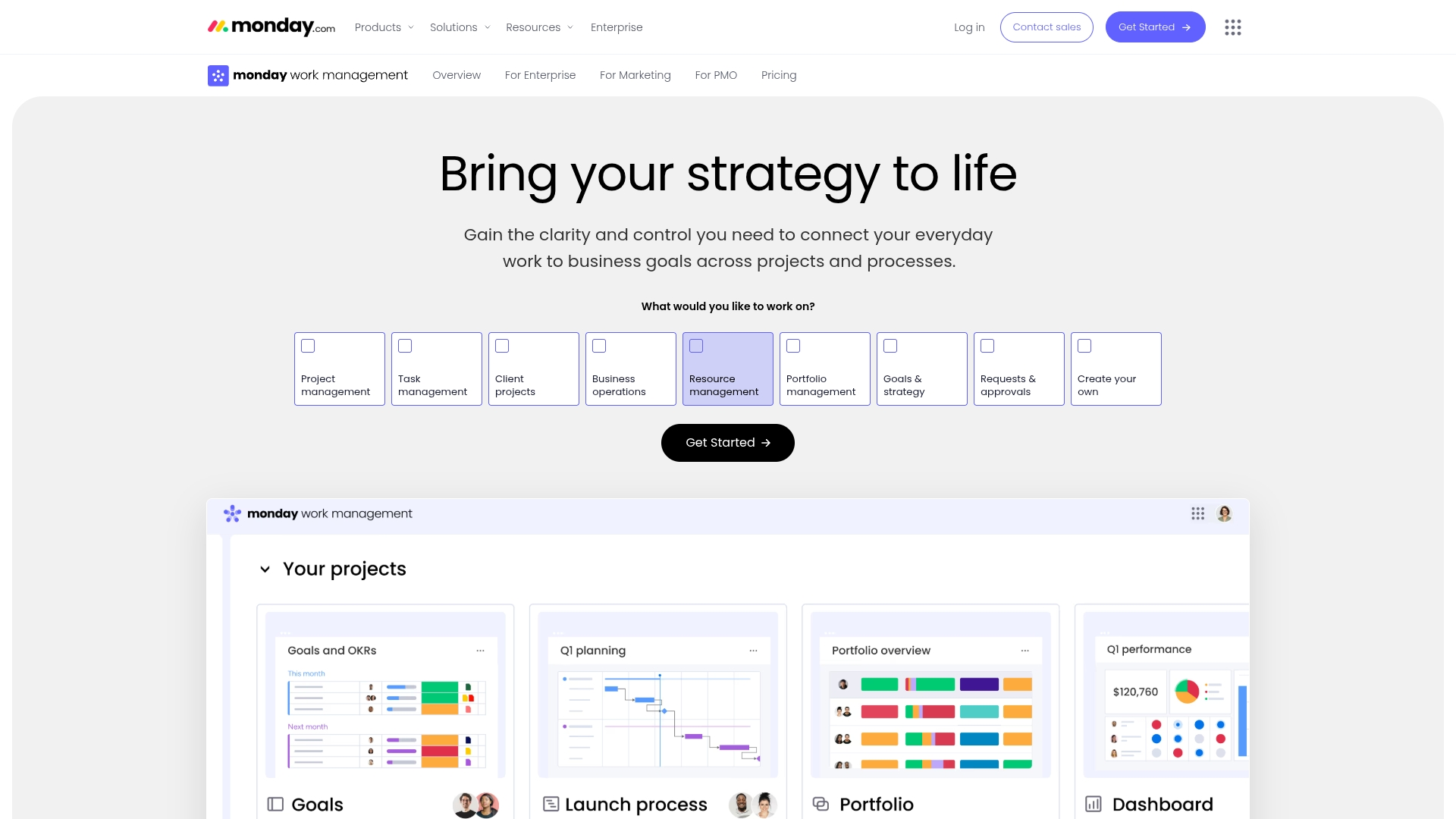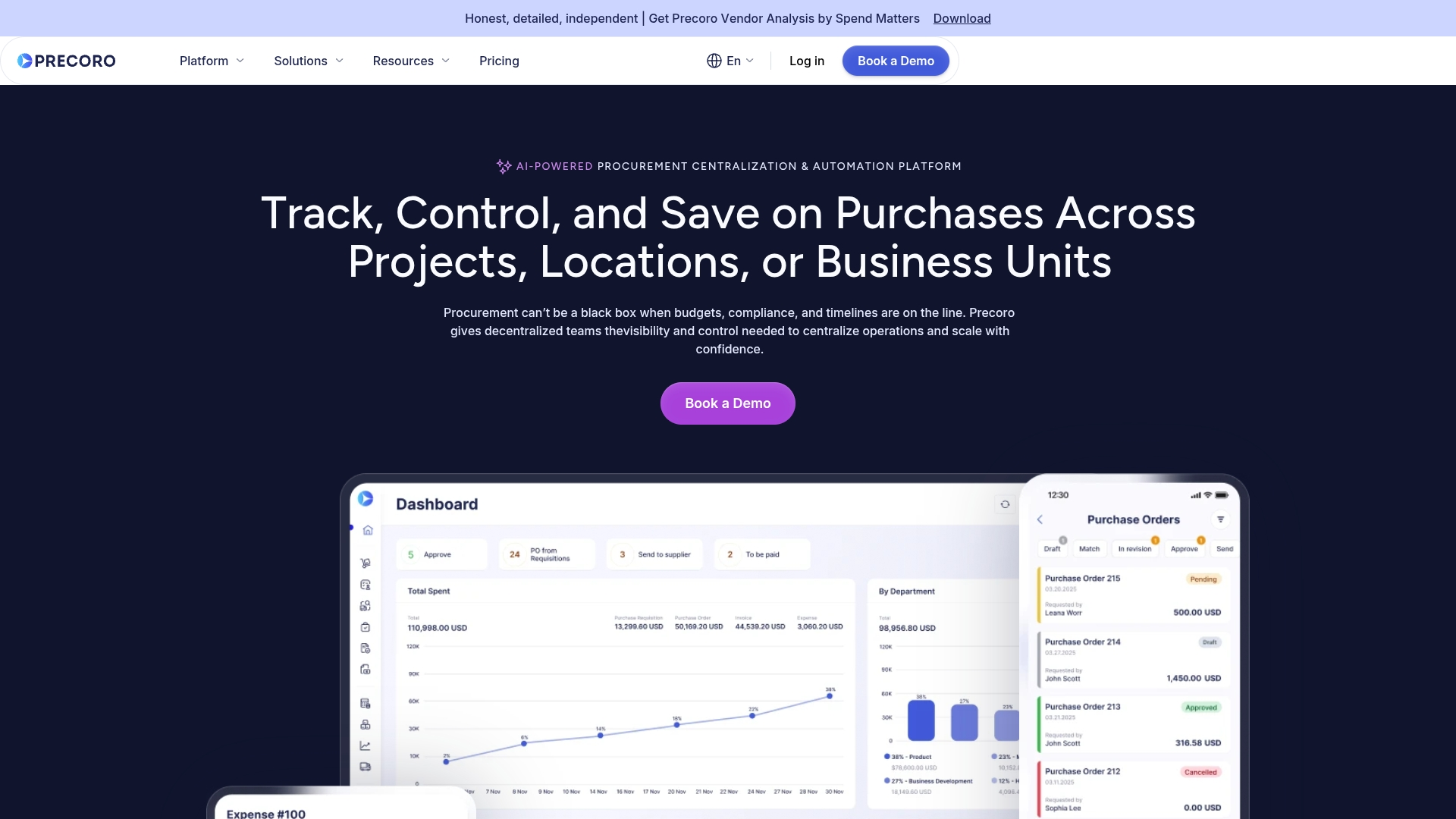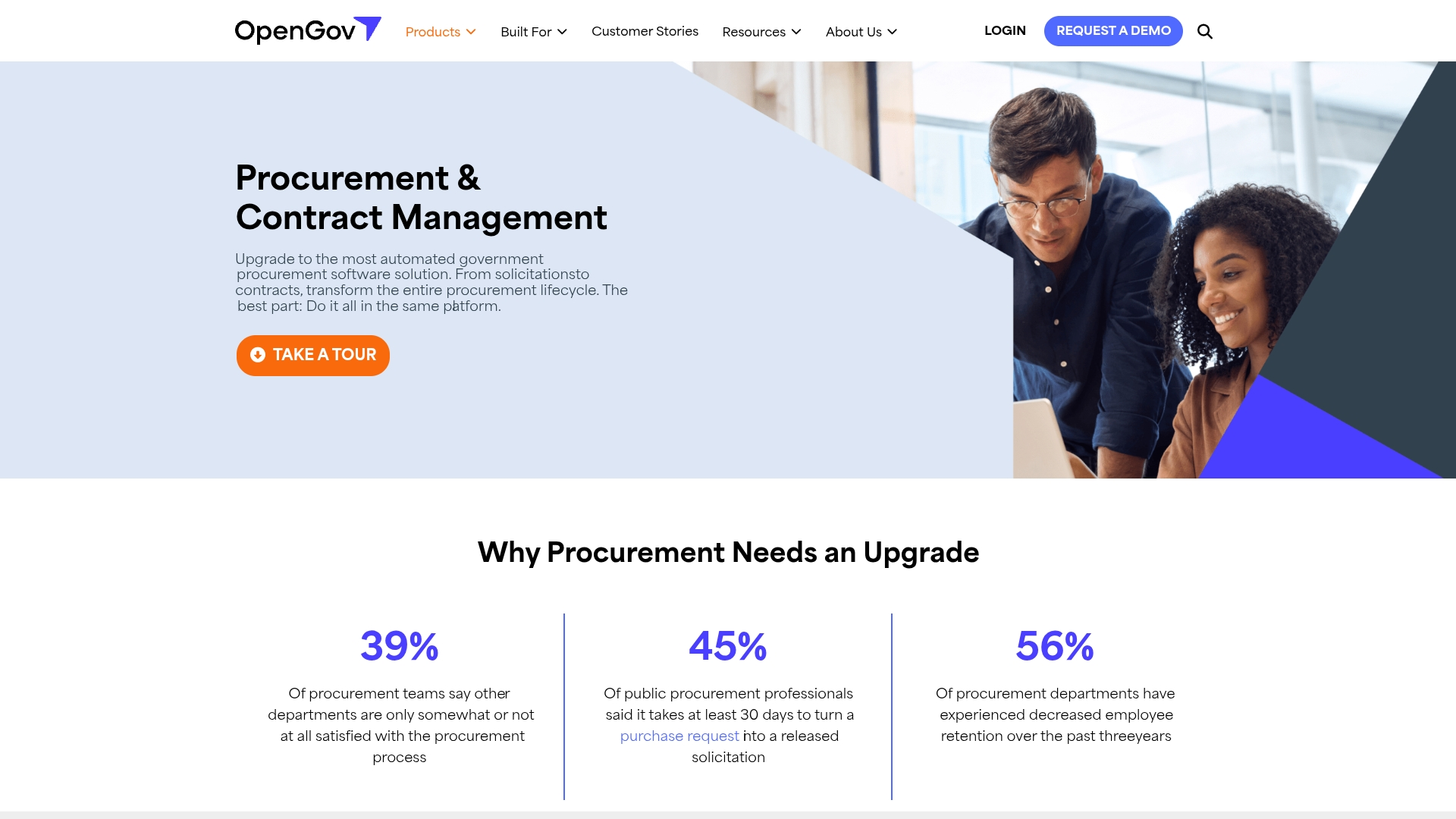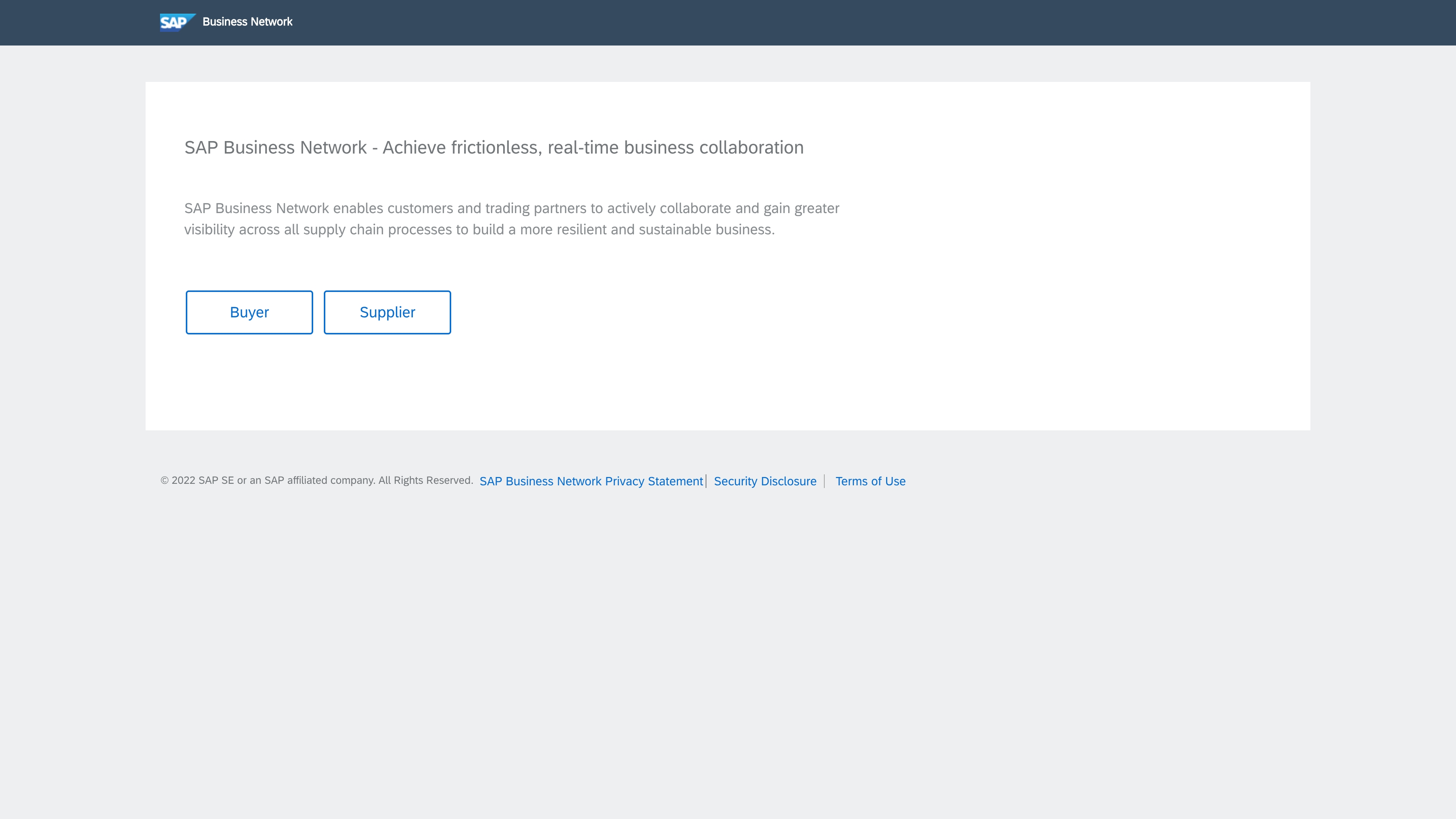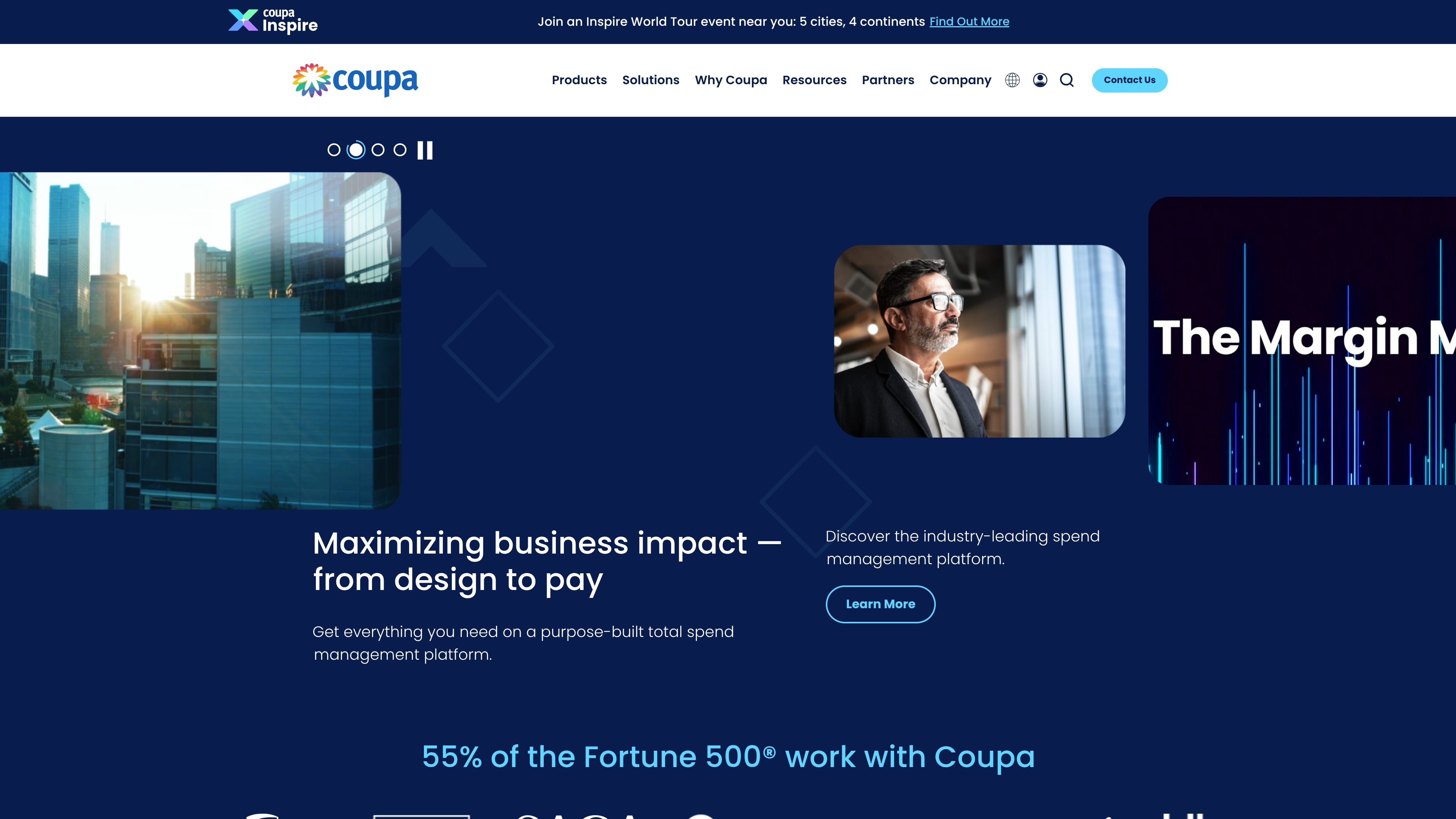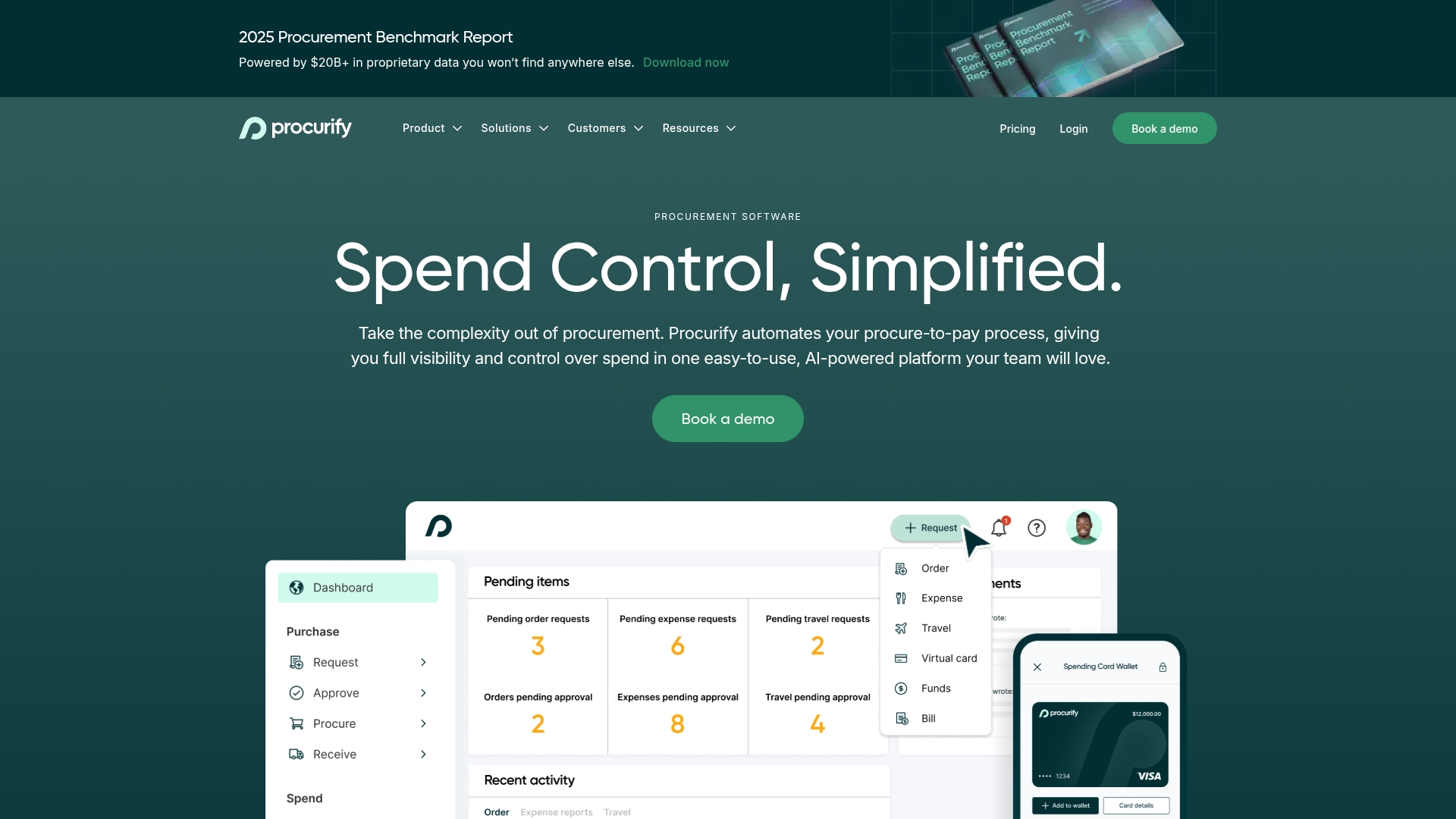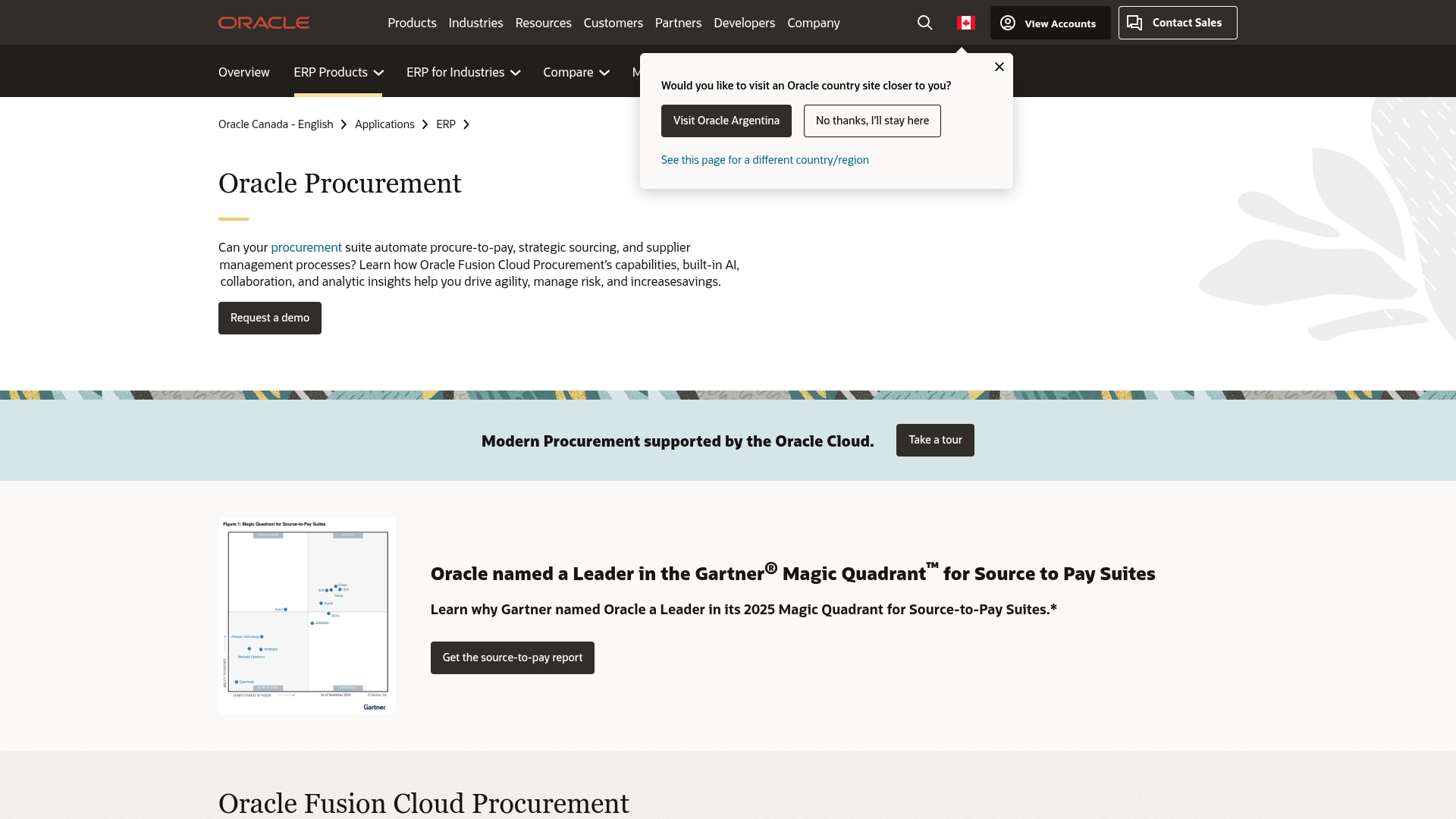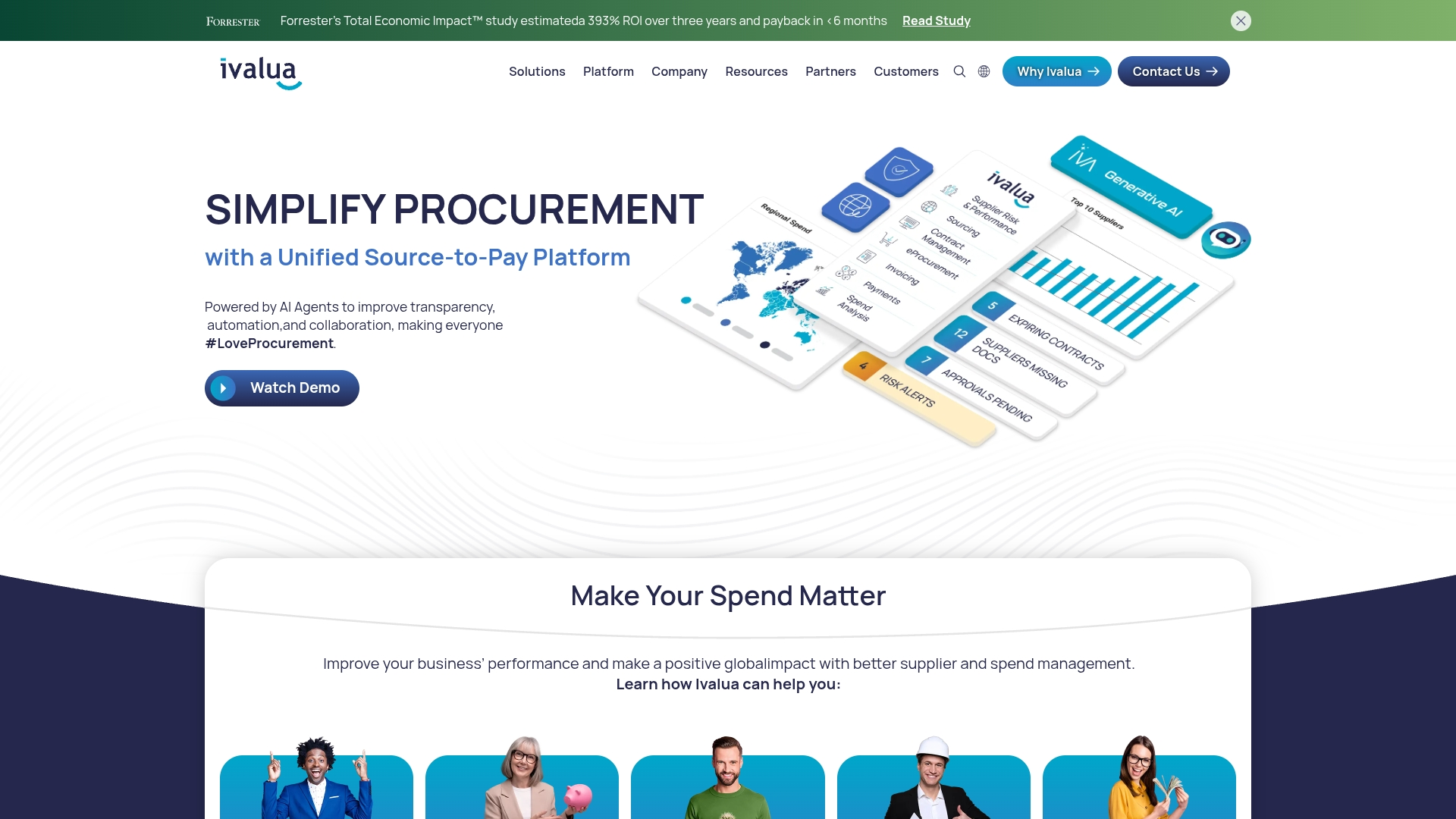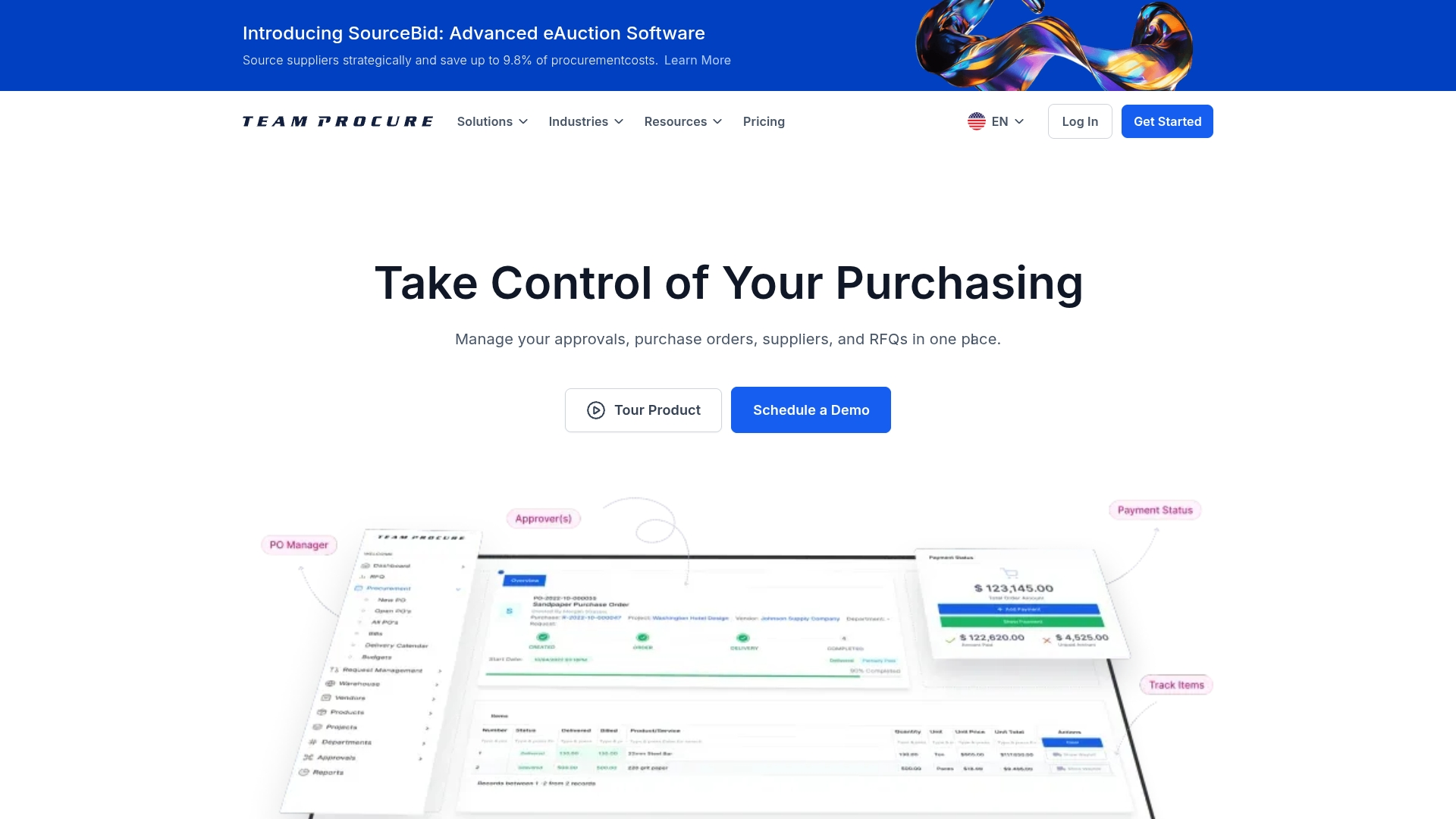Procurement is what keeps your projects moving and your budget on track. But when your team is stuck chasing down email threads or updating spreadsheets, delays and surprise costs start to pile up. The best procurement software brings everything together in one place, giving you clear oversight, faster approvals, and the confidence to make smart purchasing decisions.
In this guide, you’ll find some of the top procurement software options for every team, including monday work management, plus simple steps to get started and a look at how AI is making procurement smarter than ever.
Try monday work managementWhat is procurement software?
Procurement software functions as a central hub for every organizational purchase. It consolidates the entire buying process — from initial request to final payment — into a single, transparent, and automated workflow. This system replaces scattered spreadsheets and endless email threads with a definitive source of truth.
By digitizing the process, the software eliminates manual chaos. The need to chase approvals or hunt for payment statuses disappears as automation handles the tedious work that previously slowed teams down. It establishes a clear, compliant path for every purchase, providing built-in checkpoints that allow teams to proceed with confidence.
This unified platform connects every stage of the procurement cycle, from requisitions and approvals to invoicing and payments. With all components working in sync, procurement transforms from a complex bottleneck into a strategic advantage, offering complete visibility into spending to drive smarter, faster business decisions.
Why procurement software is essential today
Procurement has risen above being a background process to become a real driver of business growth. When your team isn’t bogged down chasing approvals or wrangling spreadsheets, they have time to do what really matters: building solid supplier relationships and finding new ways to save money. This shift is what keeps your business agile and ready for whatever comes next.
Old-school, manual processes slow everything down, creating delays and sneaky budget surprises that ripple through your projects. It’s more than just an inconvenience — every extra step or approval chase is time (and opportunity) lost.
AI-powered procurement software changes the game. Everything lives in one place, so you can see exactly what’s happening, automate the busywork, and make confident decisions in real time. The result? Your team moves faster, smarter, and with a lot less stress.
Try monday work management15 top procurement software options for purchasing efficiency
Choosing the best procurement software means empowering your team with the right tools to make smarter, faster purchasing decisions that actually move the business forward. Look for a platform that’s intuitive from day one, scales effortlessly as you grow, and brings every stakeholder together for truly seamless, strategic buying.
Want a quick snapshot before you dive into the full list? Check out the table below for a side-by-side comparison of standout procurement solutions, covering use cases, free plan availability, must-have features, and starting prices.
| Platform | Use case | Free plan? | Notable feature | Starting price |
|---|---|---|---|---|
| monday work management | Custom procurement workflows and team visibility | No | No-code automation & visual dashboards | $10/user/month |
| Precoro | SMBs needing centralized spend management | No | AI-powered invoice processing | $499/month |
| GEP SMART | Enterprise source-to-pay automation | No | Low-code AI workflow customization | Custom (from ~$500k/yr) |
| Spendwise | SMBs transitioning from manual to digital | Yes | User-friendly PO workflows | $9/user/month |
| OpenGov Procurement | Government & public sector compliance | No | AI-guided RFP builder | Custom |
| SAP Ariba | Large enterprises needing global source-to-pay solutions | No | Largest B2B supplier network | Custom (blocks of users, contact sales) |
| Coupa | Business spend management for large organizations | No | Community intelligence and benchmarking | Custom (contact sales) |
| Procurify | Mid-market spend management with proactive controls | No | Mobile-first approvals & spend cards | Custom (contact sales) |
| Oracle Procurement Cloud | Enterprises seeking deep ERP and finance integration | No | AI-powered supplier recommendations | Custom (contact Oracle) |
| Jaggaer | Enterprise source-to-pay for complex, regulated industries | No | JAI AI assistant with anomaly detection | Custom (contact sales) |
| Ivalua | Large organizations with complex, configurable needs | No | Unified S2P with external workforce management | Custom (contact sales) |
| Team Procure | Growing businesses needing collaborative procurement | 14-day free trial | Custom approval workflows & e-auctions | $250/month (3 users) |
| NetSuite Procurement | Integrated procurement for finance and inventory | No | Three-way matching & vendor portal | Custom (annual subscription, contact sales) |
| Zoho Procurements | SMBs wanting affordable, connected procurement | No | Automated requisitions & vendor portal | Custom (contact Zoho) |
| Proactis | Organizations seeking source-to-contract automation | No | Spend analysis & supplier risk tools | Custom (contact sales) |
Ready to see which platform fits your team best? Let’s break down the top options for smarter, more strategic purchasing.
1. monday work management
Transform procurement into a streamlined, visual process by connecting purchasing workflows directly to your organization’s bigger goals. With customizable, no-code workflows, monday work management is ideal for teams seeking both flexibility and transparency in their procurement operations.
Use case: monday work management brings visibility and automation to purchasing workflows, helping procurement teams track spending, streamline vendor management, and eliminate approval bottlenecks.
Key features
- Customizable procurement workflows that adapt to any purchasing process without coding
- Visual dashboards for real-time spend tracking and supplier performance monitoring
- Automation capabilities that eliminate manual procurement tasks and streamline approvals
Pricing
- Basic: $10/month per user (billed annually)
- Standard: $14/month per user (billed annually)
- Pro: $24/month per user (billed annually)
- Enterprise: Custom pricing available
Why it stands out
- No-code customization allows procurement teams to build workflows that match their exact processes
- Visual interface drives high user adoption, ensuring procurement data stays accurate and up-to-date
- Connects procurement activities to broader business goals and strategic objectives
Advanced AI features
- Spot spending patterns and risks: AI analyzes your supplier portfolio to highlight trends, flag anomalies, and surface hidden risks before they impact your bottom line.
- Instant procurement plans: The AI assistant generates detailed plans with suggested tasks, project phases, and approval workflows — customized to your organization’s needs in seconds.
- Smart request categorization: Procurement requests are automatically sorted and organized at scale, so your team spends less time on manual sorting and more time driving results.
Integrations & automations
- 200+ ready-made automations: Instantly automate approvals, onboarding, and more — no coding required.
- Effortless integrations: Connect seamlessly with SAP, Oracle, QuickBooks, and 200+ other business tools.
- API & custom connections: Easily link to specialized procurement or legacy systems as you scale.
Procurement software features
- Visual spend tracking: Instantly see where your budget stands and monitor supplier performance, so your team always knows where money is going.
- Customizable approval workflows: Stay compliant and speed up purchasing decisions by tailoring approval steps to fit your exact process — no more bottlenecks.
- Centralized supplier management: Keep all vendor details, contracts, and performance data organized in one place, making it simple to evaluate suppliers and strengthen relationships.
2. Precoro
For small to midsized businesses looking to escape procurement chaos, Precoro provides a dedicated spend management platform designed for purchasing centralization. The platform specializes in AI-powered automation and multi-level approval workflows, making it ideal for companies ready to ditch spreadsheets and email chains.
Use case: The platform is designed to accelerate the procure-to-pay cycle by at least 38% while reducing manual data entry by 80%, helping growing businesses establish scalable procurement processes that handle increasing transaction volumes.
Key features
- AI-powered invoice processing with 95% OCR accuracy and automated 3-way matching
- Customizable approval workflows with real-time notifications and mobile approvals
- Comprehensive budget tracking with real-time spend visibility across departments and projects
Pricing
- Core: $499/month (billed annually) – includes basic procurement features, automated approvals, and integrations with QuickBooks Online, Xero, and Slack
- Automation: $999/month (billed annually) – adds AI-powered AP automation, real-time budget tracking, and supplier portal
- Enterprise: Custom pricing (billed annually) – includes unlimited users, ERP integrations, and enterprise-grade data protection
Considerations
- Limited native ERP integrations compared to larger procurement software providers
- Some users report the interface can feel visually cluttered, and the mobile app experience needs improvement
3. GEP SMART
Built on Microsoft Azure, GEP SMART is a unified, AI-powered procurement platform that helps enterprises manage their entire source-to-pay process. This cloud-native solution targets large corporations and Fortune 500 companies seeking to eliminate procurement silos and streamline complex supply chain management. The platform combines advanced analytics with intuitive design to revolutionize procurement workflows.
Use case: Its core function is to provide end-to-end procurement management software capabilities, from sourcing to payment, enabling large enterprises to automate workflows, gain spend visibility, and optimize supplier relationships through a single unified platform.
Key features
- AI-powered workflow automation with low-code customization capabilities
- Advanced supplier management with real-time scorecards and collaboration tools
- Mobile-native platform enabling procurement management from anywhere
Pricing
- Pricing available upon request with implementation starting around $500,000 annually
- Quote-based pricing model tailored to enterprise requirements
- Additional costs may apply for consulting and managed services
Considerations
- High implementation costs may be prohibitive for smaller organizations
- Steep learning curve reported by users despite intuitive interface design
4. Spendwise
Targeting small to midsized businesses, Spendwise offers an affordable and user-friendly procurement solution focused on streamlining the transition from manual, paper-based systems to digital workflows. The platform focuses on essential procurement features without overwhelming complexity, making it an ideal choice for companies moving to digital for the first time.
Use case: The software’s primary application is to help businesses centralize and automate their entire procure-to-pay process, from purchase requests to final payment and reporting.
Key features
- Streamlined purchase order creation, approval, and tracking workflows
- Budget management with real-time spending visibility against allocated amounts
- Electronic bill and expense management with customizable approval processes
Pricing
- Basic: $9/user/month (minimum 1 user, up to 5 users, 10 transactions monthly)
- Pro: $19/user/month (minimum 5 users, up to 50 users, unlimited transactions)
- Enterprise: Custom pricing (minimum 5 users, unlimited users and transactions)
Considerations
- Limited customization options for reporting and analytics compared to enterprise-level procurement platforms
- Some users report wanting more advanced features like supplier performance metrics and spend cards
5. OpenGov Procurement
With a focus on the public sector, OpenGov Procurement is a specialized software designed to modernize purchasing processes for government entities, aligning well with project management for government. The platform focuses exclusively on government compliance and transparency requirements, making it ideal for cities, counties, state agencies, and special districts looking to streamline their procurement workflows.
Use case: Government agencies use OpenGov Procurement to automate their entire procurement lifecycle, from requisition to contract management, while ensuring compliance with public sector regulations.
Key features
- AI-powered solicitation builder that guides users through RFP creation with automated templates and legal language
- Collaborative evaluation platform allowing committees to review and score proposals online with real-time tabulation
- Centralized contract management with automated reminders for renewals and key dates
Pricing
Pricing is available upon request.
Considerations
- Some users report declining customer support quality following company acquisitions
- Limited pricing transparency may create barriers for smaller government entities during initial evaluation
6. SAP Ariba
Leveraging the world’s largest B2B trading network, SAP Ariba provides an enterprise-grade procurement solution that connects millions of buyers and suppliers. The platform specializes in comprehensive source-to-pay solutions, making it ideal for large organizations managing complex procurement processes across global supply chains.
Use case: SAP Ariba enables large enterprises to digitize their entire procurement lifecycle while leveraging a massive global supplier network for strategic sourcing and collaboration.
Key features
- Strategic sourcing and supplier collaboration through the world’s largest B2B network
- End-to-end procure-to-pay automation with advanced analytics and spend visibility
- Deep integration with SAP S/4HANA for unified enterprise resource planning
Pricing
- Base edition: Sold in blocks of 10 users per year with 12-60 month contracts
- Standard edition: Sold in blocks of 1 user per year with minimum 5 licensed users
- Custom Pricing Contact SAP for detailed pricing information and quotes
Considerations
- Implementation complexity can be significant for organizations not already using SAP systems
- High licensing and implementation costs may be prohibitive for smaller businesses
7. Coupa
Coupa offers a comprehensive business spend management platform that unifies procurement processes through powerful visibility and community-powered AI insights. The platform specializes in optimizing the entire procurement ecosystem for large enterprises. With over $1 billion in annual revenue and 3,000+ customers worldwide, Coupa has established itself as a leader among procurement software companies.
Use case: Coupa provides end-to-end business spend management that gives organizations complete visibility and control over procurement, invoicing, and payments from a single cloud-based platform.
Key features
- Community intelligence and benchmarking that leverages trillions of dollars in anonymized spend data to provide prescriptive insights
- Unified platform approach that integrates procurement, contingent workforce management, invoicing, and payments
- AI-driven spend analytics and automated compliance checks for streamlined procurement processes
Pricing
Pricing is available upon request.
Considerations
- Higher cost compared to competitors may be difficult to justify for smaller businesses with less complex procurement needs
- While comprehensive, companies only needing specific functionalities may end up paying for features they don’t use
8. Procurify
Procurify provides an intelligent spend management system engineered to create a proactive “spend culture” for mid-market companies. The platform specializes in end-to-end visibility, making it ideal for organizations with 50-1000 employees who need comprehensive procurement tools without enterprise-level complexity.
Use case: Procurify streamlines the complete procure-to-pay workflow from initial purchase requests through final payment, giving finance and procurement teams real-time spending visibility and automated approval processes.
Key features
- Customizable approval workflows that route purchase requests based on dollar amounts, departments, and locations
- AI-powered accounts payable automation with OCR invoice processing and 3-way matching
- Mobile apps for iOS and Android enabling on-the-go purchase approvals and expense management
Pricing
- Contact Procurify directly for custom pricing quotes
- Modular platform starting with Procurify Platform plus Purchasing
- Additional modules available: Accounts Payable, Contracts, and Expense & Card
- One-time implementation fee varies based on use cases and integrations
Considerations
- Limited to procurement workflows rather than general project management capabilities
- Spending card feature designed specifically for organizations with US entities, potentially limiting international usage
9. Oracle Procurement Cloud
As part of Oracle’s broader ERP ecosystem, the Procurement Cloud offers comprehensive source-to-settle automation for enterprises with complex procurement operations. The platform specializes in AI-powered procurement workflows and deep ERP integration, making it ideal for large organizations with sophisticated financial processes and multi-organizational structures.
Use case: Oracle Procurement Cloud streamlines end-to-end procurement processes through intelligent automation and unified data management across finance, supply chain, and human capital systems.
Key features
- AI-powered supplier recommendations and contract analysis with automated negotiation summaries
- Centralized work management hub with embedded social collaboration tools and approval workflows
- Project-based procurement capabilities that align material acquisition with specific project goals and budgets
Pricing
Pricing is available upon request.
Considerations
- Complex implementation process requiring specialized technical expertise and significant upfront investment
- User interface can feel outdated despite recent Redwood experience improvements, with occasional inconsistencies across different platform sections
10. Jaggaer
Jaggaer addresses complex procurement challenges with streamlined, automated workflows that drive real business value. The platform specializes in comprehensive source-to-pay solutions for industries like manufacturing, healthcare, and education, making it ideal for enterprises managing both direct and indirect spend across global supplier networks.
Use case: Jaggaer delivers end-to-end procurement automation through its unified JAGGAER ONE platform, enabling organizations to manage 100% of their spend while achieving significant cost savings and operational efficiency.
Key features
- Complete source-to-pay capabilities covering eProcurement, contract lifecycle management, and supplier relationship management
- AI-powered JAI assistant that automates routine tasks, detects invoice anomalies, and provides intelligent procurement insights
- Industry-specific solutions with deep compliance tools for regulated sectors like healthcare and education
Pricing
- Pricing available upon request
- Subscription-based model with costs varying by selected modules and customization level
- Implementation and integration services included in enterprise packages
Considerations
- Complex platform may present a steep learning curve for teams without adequate training and support
- Comprehensive feature set might represent higher costs for smaller organizations with straightforward procurement needs
11. Ivalua
Ivalua’s unified source-to-pay platform is built for large organizations with complex procurement requirements, offering highly configurable workflows to manage both direct and indirect materials. The platform specializes in comprehensive spend management and is ideal for enterprises seeking to transform their entire procurement lifecycle.
Use case: Ivalua excels at managing complex procurement projects and external workforce investments through a single, highly adaptable platform that scales with enterprise needs.
Key features
- Procurement project management workbench for handling complex sourcing activities and direct materials purchasing
- External workforce management solution for controlling contingent worker costs, performance, and compliance risks
- Unified platform architecture with single codebase ensuring consistent data and seamless integration across all procurement modules
Pricing
Pricing is available upon request.
Considerations
- Extensive feature set creates a steep learning curve that requires significant training and dedicated support for implementation
- Platform complexity may overwhelm smaller organizations looking for simpler procurement software solutions
12. Team Procure
Designed for growing businesses, Team Procure offers a comprehensive software solution that emphasizes collaborative workflows and intuitive automation to mature procurement processes. The platform transforms how organizations manage their entire purchasing lifecycle.
Use case: Team Procure centralizes procurement processes from purchase requests to inventory management, helping organizations gain visibility and control over their entire supply chain while reducing approval times by up to 75%.
Key features
- Custom approval workflows with built-in flowchart editor to match organizational needs
- Advanced e-sourcing capabilities including RFQ management and e-auction software for strategic supplier negotiations
- AI-powered Enigma reporting tool that generates procurement analytics using plain English queries
Pricing
- Procurement Suite: $250/month for 3 users (includes warehouse/inventory management, PR & PO management, reporting, approval workflows, and supplier management)
- Enterprise Procurement: Custom pricing available upon request (includes dedicated servers, branding, ERP integrations, supplier portal, advanced sourcing, and premium support)
- 14-day free trial available with no long-term contracts required
Considerations
- Automation workflows can be somewhat clunky according to user feedback
- Dashboard functionality may not match the comprehensive capabilities of larger enterprise platforms like Salesforce
13. NetSuite Procurement
Integrated directly within Oracle’s comprehensive business management software solutions, NetSuite Procurement centralizes purchasing activities to streamline the entire procure-to-pay process. This cloud-native platform targets growing businesses that need seamless integration between procurement, financials, and inventory management, allowing companies to gain real-time visibility into spending patterns while enforcing pre-negotiated supplier contracts.
Use case: NetSuite Procurement streamlines purchasing workflows by automating vendor management, purchase order creation, and approval processes within a unified ERP ecosystem.
Key features
- 3-way matching automatically compares purchase orders, receipts, and invoices to flag discrepancies and ensure compliance
- SuiteProcurement enables buyers to shop directly from supplier catalogs with automated purchase request creation and approval routing
- Integrated vendor portal facilitates real-time collaboration between buyers and suppliers for improved relationship management
Pricing
- Annual subscription model with 3 components: core platform, optional modules, and user count
- One-time implementation fee for initial setup
- Custom pricing based on selected modules and company size — contact NetSuite for specific quotes
Considerations
- Complex initial setup and configuration may require assistance from NetSuite partners or specialized consultants
- Higher cost investment compared to standalone procurement tools, particularly for smaller businesses evaluating cost-to-benefit ratios
14. Zoho Procurements
Drawing power from Zoho’s extensive application ecosystem, Zoho Procurements provides an affordable, integrated solution for small to medium-sized businesses to automate the procure-to-pay lifecycle. This comprehensive platform delivers exceptional value for organizations looking to streamline vendor management and spending control by connecting purchasing with broader business operations.
Use case: Zoho Procurements excels at automating purchase requisitions, vendor management, and budget tracking while integrating seamlessly with other business functions like finance and project management.
Key features
- Automated purchase requisition workflows with multilevel approval processes that ensure compliance and accountability
- Centralized vendor portal enabling streamlined supplier relationship management and performance tracking
- Real-time budget monitoring with proactive alerts and comprehensive analytics for procurement optimization
Pricing
- Pricing is available upon request from Zoho.
- Integration with other Zoho applications is available through the Zoho One bundle.
Considerations
- Advanced sourcing capabilities may be limited compared to specialized enterprise procurement platforms.
- Mobile app functionality lacks some of the comprehensive features available in the web version.
5 steps to successfully adopt procurement software
Implementing new procurement software is a strategic move that can redefine your team’s efficiency. A successful transition translates to less time spent on manual tasks and greater control over the entire purchasing process, from request to payment.
Adhering to a clear implementation plan is crucial for a smooth rollout that empowers your team to make smarter, faster decisions. Here’s how:
1. Map your current workflow to spot the gaps
Before you can improve your process, you need to see it clearly. Lay out every step from request to approval to find the bottlenecks and manual work slowing everyone down. This gives you a baseline to set clear goals, like cutting approval delays in half.
With a visual workflow management platform like monday work management, you can easily map your existing workflow. This creates a single source of truth that helps your whole team see what needs to change.
2. Find the right tool for your team
Focus on software that fits how your team actually works. The best tool should be intuitive and easy to use from day one, not require weeks of training. Prioritize platforms that integrate seamlessly with the systems you already use and can scale as your team grows.
3. Run a small-scale pilot to learn and adjust
Before going all-in, test the software with a small group or a single process. This controlled test run lets you gather real-world feedback and work out any kinks without disrupting the entire organization. A flexible platform is key here, allowing you to quickly adjust workflows based on what you learn.
4. Empower your team with the right training
Great adoption starts with great training. Show your team how the new software and integrations make their jobs easier, not more complicated. When people understand the ‘why’ behind the change and see the benefits firsthand, they’ll be excited to get on board.
5. Track your wins and keep improving
Once you’re up and running, keep an eye on what matters most — like cycle times, cost savings, and team satisfaction. Use real-time dashboards to track your progress and share the wins with your stakeholders. This data isn’t just for reports; it’s your guide to continuously refining your process and building on your success.
Try monday work managementTurning common procurement hurdles into wins
Rolling out new procurement software is a big shift for any team. Change can be met with hesitation, especially when moving away from familiar spreadsheets and email threads. The key to building buy-in? Start by showing real, everyday benefits. Even automating just one manual approval or request can be the spark that turns skepticism into excitement.
Centralizing your procurement data — from purchase requests to approvals and invoices — may sound overwhelming at first. But consolidating everything in one place gives your entire team a single source of truth, so everyone knows exactly where things stand and what needs attention. monday work management simplifies this transition by bringing all procurement activities onto one visual platform, making it easy to track progress, speed up approvals, and keep your projects moving.
No two teams work exactly alike, and rigid, one-size-fits-all processes rarely work. That’s where monday work management shines, letting you customize procurement workflows to match your unique needs while standardizing key steps while giving your team the flexibility to work in a way that feels natural. The result? Consistency and compliance, without slowing anyone down.
How AI is transforming procurement management
Your team’s time is best spent on strategy, not sifting through spreadsheets and chasing approvals. AI helps you reclaim those hours by turning complex manual work into AI workflow automation. This shift allows your team to focus on what truly matters: building strategic partnerships and delivering more value.
Here’s how AI gives your team a competitive edge:
- Pinpoint savings instantly: AI flags spending anomalies and opportunities you might have missed.
- Select suppliers with confidence: Automatically evaluate vendor performance and risk factors without the manual overhead.
- Master your contracts: Let AI extract key terms, dates, and obligations from dense legal documents in seconds.
- Forecast needs accurately: Predict purchasing demands using historical data and market trends to stay ahead of the curve.
Here’s a quick look at how AI is reshaping every stage of procurement compared to traditional methods:
With monday work management, AI isn’t a separate tool — it’s woven directly into your procurement flows. By automating routine tasks, the platform gives your team the data and breathing room to negotiate better deals. You get to move from being reactive to proactive, making faster, smarter decisions with complete confidence.
Try monday work managementTaking your purchasing process further
With your procurement software successfully implemented, the next evolution is to elevate your team’s role. The focus can now shift from merely processing requests to actively shaping company growth by cultivating a deeply connected purchasing ecosystem.
This advancement hinges on connection: integrating your procurement team with finance and operations on a single, shared platform. Real-time, universal access to information transforms purchasing from a transactional function into a strategic one, revealing new opportunities for cost savings and collaborative efficiency.
Furthermore, this evolution is about cultivating stronger vendor partnerships rather than just managing transactions. A platform like monday.com provides the flexible workflows and clear insights necessary to ensure every purchasing decision is strategic, transforming your department into a powerhouse of efficiency and foresight.
Try monday work managementFAQs
What software is used for procurement?
Procurement software automates purchasing workflows using platforms like monday.com, Precoro, and SAP Ariba. These tools digitize the entire process from request to payment, helping teams manage vendors and process invoices more efficiently.
What are the 4 main types of procurement?
The 4 main types are direct (production materials), indirect (operational expenses), services (professional support), and strategic (high-value, complex purchases). Each type requires a unique management approach to meet specific business needs.
Is SAP a procurement tool?
Yes, SAP provides procurement tools, most notably through SAP Ariba, its dedicated cloud platform for sourcing and supplier management. While SAP is a broader ERP system, Ariba is its specialized procurement solution.
Is ERP a procurement software?
An enterprise resource planning system often includes a procurement module, but it's not a specialized procurement software. Dedicated platforms offer more advanced features and flexibility for complex purchasing needs than a standard ERP module.
How does mobile procurement work for distributed teams?
Mobile procurement apps let team members create requests, approve orders, and track deliveries from anywhere, directly from their phones. This keeps the purchasing process moving forward without delays, even when your team is working remotely or in the field.
How can AI help reduce costs in procurement?
AI helps reduce costs by automatically spotting savings opportunities, flagging duplicate invoices, and suggesting better suppliers. It also automates routine tasks, freeing up your team to focus on more strategic work instead of manual data entry.

